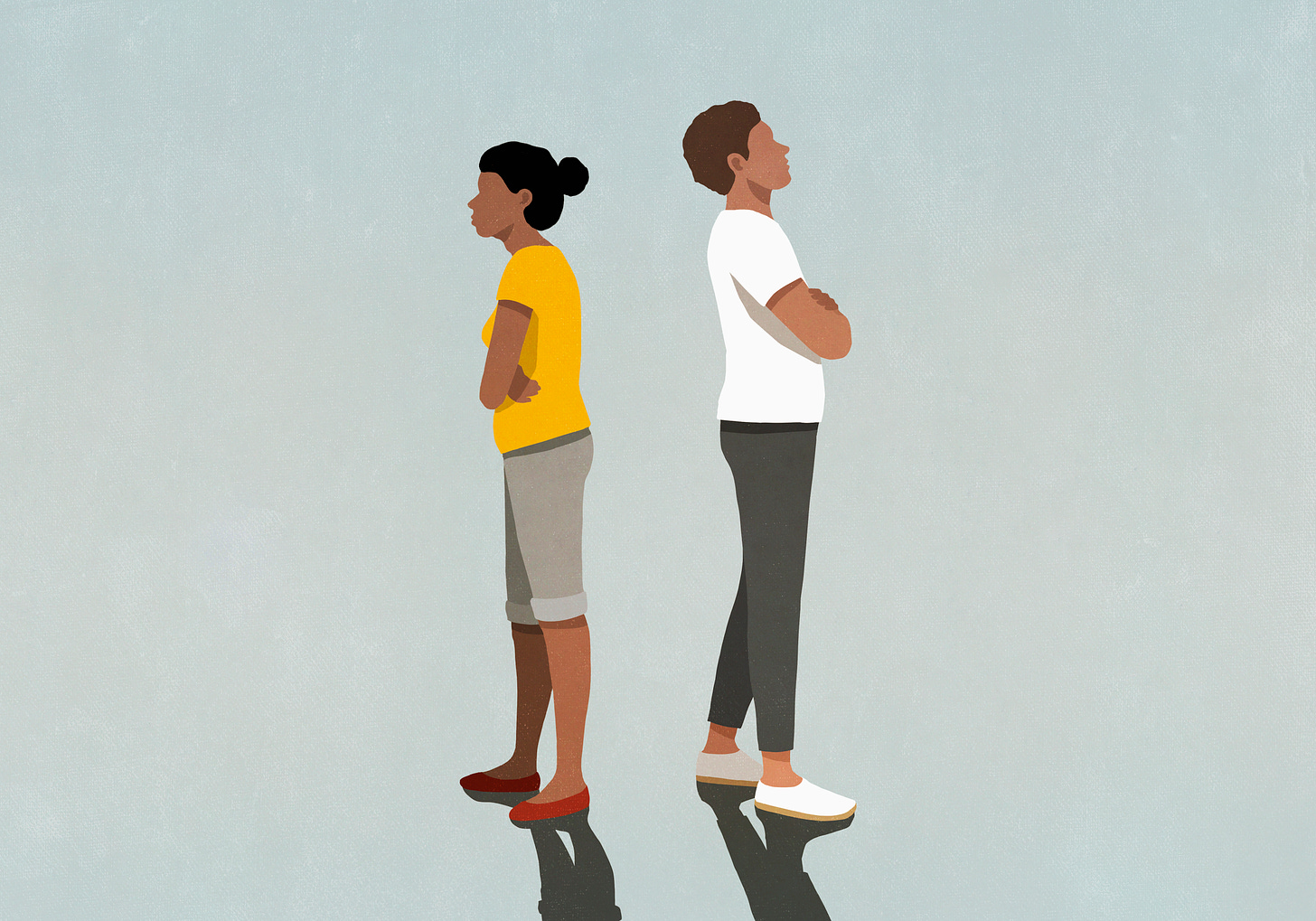Weekend reads: No, young men are not turning away from gender equality
But like many women, they have mixed feelings about feminism.
One of the main themes of the Lean Out Substack is gender relations. I’m interested in how modern men and women relate to one another, the unique challenges that face both sexes — and how we create a more thoughtful and nuanced public conversation around these issues.
I’ve interviewed heterodox thinkers such as Louise Perry, Mary Harrington, Christine Emba, and Erika Bachiochi on the need to rethink feminism, and have covered various facets the crisis facing men. (And, most recently, hosted a guest essay from pollster Daniel Cox on the political gender divide.)
I’ve been following the work of Richard V. Reeves, founding president of the American Institute for Boys and Men, for some time, and have much respect for his approach. (You can stream our interview here, on his book, Of Boys and Men: Why the Modern Male Is Struggling, Why It Matters, and What to Do About It.)
Today, I’m delighted to bring you a fascinating essay on the supposed male backlash against gender equality from Richard, co-authored with data scientist Allen B. Downey and originally published in Richard’s must-read Substack newsletter. — TH
Is there a male backlash against the progress of women? Many fear so. Kate Manne, a prominent feminist writer, for example, wrote recently that “the anti-feminist backlash is because some men, including young men, are enraged by women's progress and autonomy”.
Certainly there is some evidence from recent surveys that young men are more lukewarm about feminism, compared to both their female peers and older men. In a 2023 Equimundo survey, for example, only half of men aged 18-23 agreed with the statement, “Feminism has made America a better place”, lower than the share of men in older age groups (up to the age of 45).
This survey and others also include a range of questions about whether men or women have it harder today, which gender faces more discrimination, whether feminism and/or the move for women’s rights has “gone too far”, and so on.
Who's afraid to be a feminist?
But the responses to these kinds of questions are hard to interpret, for a number of reasons.
First, they have not been consistently asked in the past, so it’s hard to know if there’s any trend.
Second, they often rely on highly subjective responses to relative questions, such as “too far” compared to “far enough” or “not far enough”, or of one group facing greater discrimination or hardship — “have it harder today”, for example — than another group.
Third, the responses rely heavily on the definition of the terms being used. The term “feminist” is the most obvious one here. It seems likely that the label is seen differently by different groups, especially across generations. In my experience, there are at least as many kinds of feminists as there are Christians.
It is true that most men do not self-describe as feminists. But then, most women don’t either; in most surveys a minority of women describe themselves as feminists. For example:
In the U.S., just 29% of women identified as feminists in a 2019 poll by Ipsos. There were differences by age, education and political affiliation: Only 7% of Republican and Republican-leaning women say that the term feminist describes them “very well”, compared to 28% of Democrat women, for example. But in no group were self-declared feminists in the majority.
Fewer than one in ten women (9%) agreed with the statement “I describe myself as a feminist” in a 2016 poll in the UK. But other polls in the UK find higher numbers, such as a 34% share in a 2018 poll (versus 18% of men in the same poll)
Even in Sweden — one of the most gender equal nations in the world — a minority of women (46%) agree with the statement “I define myself as a feminist” (for Swedish men the share was even lower, at 28%)
But of course what matters here is what the respondents think feminism is, and by extension what it means to be a feminist.
In one fascinating international poll by YouGov, three versions of the question about support for feminism were asked, each to one third of the sample. The three questions were as follows:
“Are you a feminist?”
“One definition of a feminist is someone who thinks men and women should have equal rights and status in society, and be treated equally in every way. Are you a feminist?”
“Do you think men and women should or should not have equal rights and status in society, and be treated equally in every way?”
As you might expect, the responses to these questions were markedly different. Here are the results for the U.S.:
As the chart shows, the level of support varies from 32% for the first question to 77% for the third. The third question sets the bar quite high, too, asking not only about support for equal rights and status for men and women, but for them “being treated equally in every way” (our italics).
So there is widespread support for the ideal of gender equality, and to a slightly lesser extent for feminism, when it is defined in terms of support for gender equality — but not when it is asked as a blunt question.
The 2016 poll in the UK that found just 9% of women describing themselves as a feminist also found a further 65% of women agreeing with the statement “I believe in equality for women and men but I don’t describe myself as a feminist”. The Fawcett Society, a women’s advocacy group who commissioned the survey, argued that since feminism simply means support for gender equality, the UK is a nation of “hidden feminists”.
It is clear that in this area — as in many others — a great deal hinges on the way questions are framed and interpreted. Skepticism about feminism certainly cannot be automatically read as opposition to gender equality. So, what’s really going on?
Better questions on gender equality
A good place to look for more solid evidence on support for gender equality is the General Social Survey (GSS) which includes several questions related to gender roles and equality, some asked regularly for more than 50 years.
Support for gender equality became so widespread in the last few decades of the 20th century that some questions were dropped from the survey. The following three questions have not been asked in the GSS since 1998 (with % support in that year shown for each):
“It is more important for a wife to help her husband’s career than to have one herself.” (19%)
“Women should take care of running their homes and leave running the country up to men.” (15%)
“Do you approve or disapprove of a married woman earning money in business or industry if she has a husband capable of supporting her?” (82% approve)
A question about support for female presidential candidates was dropped in 2010, when the level of support hit 96%:
“If your party nominated a woman for President, would you vote for her if she were qualified for the job?”
The remaining gender equality questions in the GSS provide a good window into recent trends and current levels of support. Three of these questions (often framed as statements with which respondents agree or disagree) are focused on childrearing and gender roles in the family:
“A working mother can establish just as warm and secure a relationship with her children as a mother who does not work.”
“A preschool child is likely to suffer if his or her mother works.”
“It is much better for everyone involved if the man is the achiever outside the home and the woman takes care of the home and family.”
Another question, perhaps even more topical this week, relates to women in poltics:
“Tell me if you agree or disagree with this statement: Most men are better suited emotionally for politics than are most women.”
Men still supporting gender equality
In the charts below we show trends in opinion on these questions for four groups: young men (under 30), young women, older men (30 or over), and older women. The curves are smooth fits to the data. The green points show the unsmoothed data for young men so we can see variation around the curve, especially in the most recent years.
The overall picture here is of steadily increasing support for gender equality among all groups, including young men. In the GSS at least, there is no evidence of a backlash against the basic principles of gender equality. This is good news, and runs counter to much of the current narrative, especially with regard to young men.
Some skepticism about affirmative action for women at work
In 1996 the GSS added two questions related to affirmative action on behalf of women in the workplace:
“Because of past discrimination, employers should make special efforts to hire and promote qualified women.”
“Some people say that because of past discrimination, women should be given preference in hiring and promotion. Others say that such preference in hiring and promotion of women is wrong because it discriminates against men. What about your opinion — are you for or against preferential hiring and promotion of women?”
In recent responses to these questions, men are more skeptical, both compared to men in previous surveys and to women. Here are the results showing levels of support on these questions:
A couple of points here:
The two questions generate very different levels of support overall. The first question is short and invokes the idea of “special efforts” from employers. The second invokes the idea of giving a “preference” to women in hiring and promotion, and also introduces the counter argument that this amounts to “discrimination against men”.
The gender gap among young respondents on these questions seems to have widened. While women are becoming more supportive of special efforts to hire and promote women, men — especially young men — are becoming somewhat less so. (Note that support among older men looks stable).
Skepticism about affirmative action should not, in our view, be interpreted as skepticism about equality. Reasonable people can disagree about how much special consideration today is justified by discrimination in the past.
As women advance in the labor market, it might not be a surprise to see support for positive discrimination weaken. But this looks to be one dimension of the gender equality debate where men and women may be less closely aligned in their views today, with young women especially becoming more supportive of special efforts on their behalf than in the past, and young men less so. (This might be a good area for some deeper survey work).
Backlash anxiety is overstated
Based on our reading of the GSS data, there is no strong evidence of weakening support for the core principle of gender equality among men, including young men.
Questions about the relative position of men and women, the role of feminism, the case for preferential treatment, the extent of sex discrimination (in either direction) are being asked with new urgency. There is much to learn here. But it should be some comfort that, up to this point, fears of a male backlash against gender equality are likely overstated.
Richard V. Reeves is the founding president of the American Institute for Boys and Men, and the author of Of Boys and Men: Why the Modern Male Is Struggling, Why It Matters, and What to Do About It. You can find Richard’s newsletter here. (And listen to Lean Out’s podcast interview with him here.)
Allen B. Downey is a Professor Emeritus at Olin College and the author of Think Python, Think Bayes, and Probably Overthinking It. You can find his newsletter here.















Feminism is a cult.
Tara,
Are you aware that every large corporation openly and unapologetically discriminates against hetero white males? (I've gotten his unanimously from about a dozen younger friends, none of whom are particularly ideological; in fact one is/was a Bernie bro). If you wanted create a generation of misogynists, you couldn't devise a better plan. And, the discrimination applies to college admissions too.
The utter absurdity of "preferencing" women because of possible past discrimination can be shown by saying "Because my grandmother was discriminated against, my brother must be discriminated against.". They aren't the same people. You have to make these distended arguments about the legacy of sexual discrimination still holds girls back; despite any evidence of this.
I say "possible past discrimination" because I'm 65. The Bakke Decision was 1978 when I was a sophomore in college. So, "affirmative action" had been in place since the early 70's; so basically my entire adult life. When I matriculated to MIT in 1976, they were crowing how they'd gotten the % of females up t0 22% from 9%, which immediately struck me as absurd. Just admit the best students and let the chips fall where they may. Of course, that's not what happened. And now it's like 52%, which is absurd. A casual review of HS students' interests show that girls are far more interested in The Arts etc than boys. Maybe they are all polymath geniuses.
Re: feminism. It has changed. My mom was a second wave feminist, as am I. These "feminists" today are really just man-haters and grifters. But, they have the power of the media, hollywood, Law, etc behind them. As a Classical Liberal I just never thought I'd see a day like this; where "equality" is really "equity" which is really just enforced equal outcomes. (Actually, enforced unequal outcome, since women are overrepresented if you think about it.0
The problems/poor choices young women make (that you've eloquently discussed) are a direct result of all this. Males are suspect. Your career is your source of happiness (and we're going to hire, promote and pay you well !!). You don't need a man. And then suddenly you're 40+ and having a husband (I won't say "life partner") and kids sounds like something I should have done.
Life is trade-offs. You can't work 70 hrs a week on your career and also have a family and a marriage and extended family. Women in my generation were filled with guilt with either path they took (career or marriage/family). I'd long hoped that would change. That women would be happy with whatever path they took. Young women today, as you have documented, aren't even aware they are making a choice. Until it's too late.